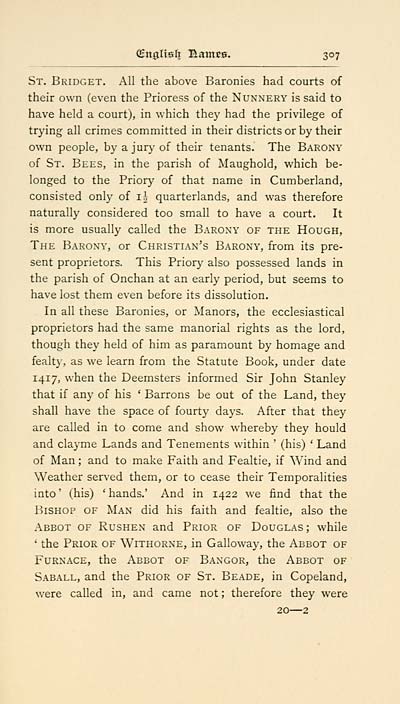Download files
Complete book:
Individual page:
Thumbnail gallery: Grid view | List view

Cnglisri Barnes. 307
St. Bridget. All the above Baronies had courts of
their own (even the Prioress of the Nunnery is said to
have held a court), in which they had the privilege of
trying all crimes committed in their districts or by their
own people, by a jury of their tenants. The Barony
of St. Bees, in the parish of Maughold, which be-
longed to the Priory of that name in Cumberland,
consisted only of i| quarterlands, and was therefore
naturally considered too small to have a court. It
is more usually called the Barony of the Hough,
The Barony, or Christian's Barony, from its pre-
sent proprietors. This Priory also possessed lands in
the parish of Onchan at an early period, but seems to
have lost them even before its dissolution.
In all these Baronies, or Manors, the ecclesiastical
proprietors had the same manorial rights as the lord,
though they held of him as paramount by homage and
fealty, as we learn from the Statute Book, under date
1417, when the Deemsters informed Sir John Stanley
that if any of his ' Barrons be out of the Land, they
shall have the space of fourty days. After that they
are called in to come and show whereby they hould
and clayme Lands and Tenements within ' (his) ' Land
of Man ; and to make Faith and Fealtie, if Wind and
Weather served them, or to cease their Temporalities
into ' (his) ' hands.' And in 1422 we find that the
Bishop of Man did his faith and fealtie, also the
Abbot of Rushen and Prior of Douglas; while
' the Prior of Withorne, in Galloway, the Abbot of
Furnace, the Abbot of Bangor, the Abbot of
Saball, and the Prior of St. Beade, in Copeland,
were called in, and came not ; therefore they were
20 — 2
St. Bridget. All the above Baronies had courts of
their own (even the Prioress of the Nunnery is said to
have held a court), in which they had the privilege of
trying all crimes committed in their districts or by their
own people, by a jury of their tenants. The Barony
of St. Bees, in the parish of Maughold, which be-
longed to the Priory of that name in Cumberland,
consisted only of i| quarterlands, and was therefore
naturally considered too small to have a court. It
is more usually called the Barony of the Hough,
The Barony, or Christian's Barony, from its pre-
sent proprietors. This Priory also possessed lands in
the parish of Onchan at an early period, but seems to
have lost them even before its dissolution.
In all these Baronies, or Manors, the ecclesiastical
proprietors had the same manorial rights as the lord,
though they held of him as paramount by homage and
fealty, as we learn from the Statute Book, under date
1417, when the Deemsters informed Sir John Stanley
that if any of his ' Barrons be out of the Land, they
shall have the space of fourty days. After that they
are called in to come and show whereby they hould
and clayme Lands and Tenements within ' (his) ' Land
of Man ; and to make Faith and Fealtie, if Wind and
Weather served them, or to cease their Temporalities
into ' (his) ' hands.' And in 1422 we find that the
Bishop of Man did his faith and fealtie, also the
Abbot of Rushen and Prior of Douglas; while
' the Prior of Withorne, in Galloway, the Abbot of
Furnace, the Abbot of Bangor, the Abbot of
Saball, and the Prior of St. Beade, in Copeland,
were called in, and came not ; therefore they were
20 — 2
Set display mode to: Large image | Transcription
Images and transcriptions on this page, including medium image downloads, may be used under the Creative Commons Attribution 4.0 International Licence unless otherwise stated. ![]()
| Early Gaelic Book Collections > Blair Collection > Surnames & place-names of the Isle of Man > (325) |
|---|
| Permanent URL | https://digital.nls.uk/82103548 |
|---|
| Description | A selection of books from a collection of more than 500 titles, mostly on religious and literary topics. Also includes some material dealing with other Celtic languages and societies. Collection created towards the end of the 19th century by Lady Evelyn Stewart Murray. |
|---|
| Description | Selected items from five 'Special and Named Printed Collections'. Includes books in Gaelic and other Celtic languages, works about the Gaels, their languages, literature, culture and history. |
|---|

